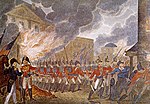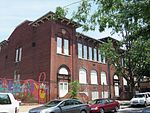District of Columbia statistical areas
AC with 0 elementsUnited States statistical areasWashington, D.C.-related lists

The United States District of Columbia (Washington, D.C.) is the primary city of two statistical areas that have been delineated by the Office of Management and Budget (OMB). On March 6, 2020, the OMB delineated the Washington-Arlington-Alexandria, DC-VA-MD-WV Metropolitan Statistical Area and the more extensive Washington-Baltimore-Arlington, DC-MD-VA-WV-PA Combined Statistical Area.
Excerpt from the Wikipedia article District of Columbia statistical areas (License: CC BY-SA 3.0, Authors, Images).District of Columbia statistical areas
3rd Street Northwest, Washington
Geographical coordinates (GPS) Address Nearby Places Show on map
Geographical coordinates (GPS)
| Latitude | Longitude |
|---|---|
| N 38.9101 ° | E -77.0147 ° |
Address
3rd Street Northwest 1513
20001 Washington
District of Columbia, United States
Open on Google Maps










